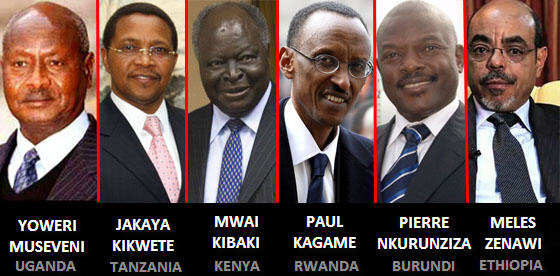
[HOME ] [ABOUT] [PHOTOS] [VIDEO] [BLOG] [HOUSTON] [TEXAS] [U.S. NEWS] [WORLD NEWS] [SPORTS] [POP CULTURE] [CONTACT]
Part I: The Entebbe Agreement - Egypt's Focus At African Summit

The six African presidents who signed the Entebbe Agreement
by Joseph Earnest July 8, 2012
Newscast Media ENTEBBE, Uganda—Egypt's new president, Mohammed Morsy, is making the discussion of the Entebbe Agreement a priority on his agenda this month. Sources informed Egypt's paper Al-Masry Al-Youm that President Mohammed Morsy will visit Addis Ababa, the capital of Ethiopia, following his visit to Saudi Arabia on Wednesday. Ambassador Mona Omar, assistant foreign minister for African affairs, stressed the importance of Morsy's participation in the next African Summit.
"President Morsy's participation at the summit is a message to Africa and the world, stating that Egypt, in the era of the [second] presidency, intends to play an influential and active role in all African issues," the ambassador told Al-Masry Al-Youm.
According to Omar, the president is expected to hold bilateral meetings with many African leaders at the summit, including Ethiopian Prime Minister Meles Zenawi. She pointed out that after the January 25 revolution, Zenawi announced the signing of the Entebbe Agreement, which would govern the division of Nile water, would be postponed until a new president is elected in Egypt. The agreement was signed by six Nile Basin countries, but rejected by Egypt and Sudan.
The Entebbe Agreement, which is also called the Cooperative Framework Agreement (CFA) was signed by the following countries: Uganda, Kenya, Tanzania, Ethiopia, and Rwanda, then on February 28, 2011, Burundi became the sixth signatory. Egypt argues that both the 1959 agreement, as well as another accord signed in 1929 under British rule, stipulate that the approval of all Nile Basin states must be gained before the implementation of any water-utilization projects.
However, the six countries that signed the Entebbe Agreement rejected such reasoning, and reminded the Egyptians that the 1929 and 1959 agreements were void and invalid because they were written and ratified under British colonialism by colonialists. The recently-revised Entebbe Agreement that was signed on May 4, 2010, was written by native, full-blooded Africans.
The 1929 agreement gave Egypt veto-power over any project being built along the Nile, and also gave it the lion's share of the waters. Ethiopia, for example, has been able to utilize only 0.65 percent of the water resources of the Nile basin even though it contributes 86 percent of the Nile waters. The upper White Nile riparian states, namely Kenya, Uganda, Tanzania, Rwanda, Burundi and the Democratic Republic of Congo, together use less than 0.05 cubic kilometers of the waters of the Nile. Compared to the 55.5 cubic kilometers used by Egypt, it is safe to conclude that these states haven't even begun using the Nile.
As an act of defiance against the agreements written by British colonialists, the Ethiopians, in 2011 announced plans to build the controversial "Great Millennium Dam" one of the biggest dams in Africa, with a capacity to produce 5,250 megawatts of electricity. Research and construction plans for the dam started without delay, about 45 kilometers from the Sudanese border. Egypt then demanded the submission of technical and environmental studies for the proposed dam, and eventually dispatched an Egyptian high-level delegation that arrived in Addis Ababa to inspect the plans. Egypt even warned that it would resort to pressure by the international community or even consider military action if Ethiopia failed to reply.
Upon receiving the message, the Ethiopian government laughed at the threats, and dared the Egyptians to make them (the Ethiopians) reveal the plans. Realizing the Ethiopians weren't playing games, Egypt backed off, and Reuters news agency reported the hysterics between the two countries here. (pop-up)
According to an essay written by Abadir M. Ibrahim, of St. Thomas Law School, who is a graduate and scholar of Human Rights Law, Constitutional Law, Administrative Law, Private International Law (Conflict of Laws), and Legal History, the hydro-politics of the Nile is dominated by Egyptian hegemony played out in the spirit of controlling and owning the Nile rather than that of regulation or cooperation.
In his essay, The Beginning of the End of Egyptian Hydro-Political Hegemony, Ibrahim writes that due to Egypt's monopoly over the Nile, and the fact that Ethiopia is the most voluminous contributor to the waters of the Nile, the realpolitik of the river has mostly been played-out between the two states and to some extent with Sudan. The seriousness of the mistrust of these states is reflected in that not only is the Nile an object of nationalistic sentiment in these countries, but it has also entered the mythological beliefs of their populations and political leaders. Abundant literature exists on Ethiopian folk-tales relating to the possibility of turning Egypt into a desert by cutting off the waters or the Nile.
Continue to Part II--The Nile River and The Entebbe Agreement >>
|
|
Join the Newscast Media social networks
for current events and multimedia content.
Copyright© Newscast Media. All Rights Reserved. Terms and Privacy Policy